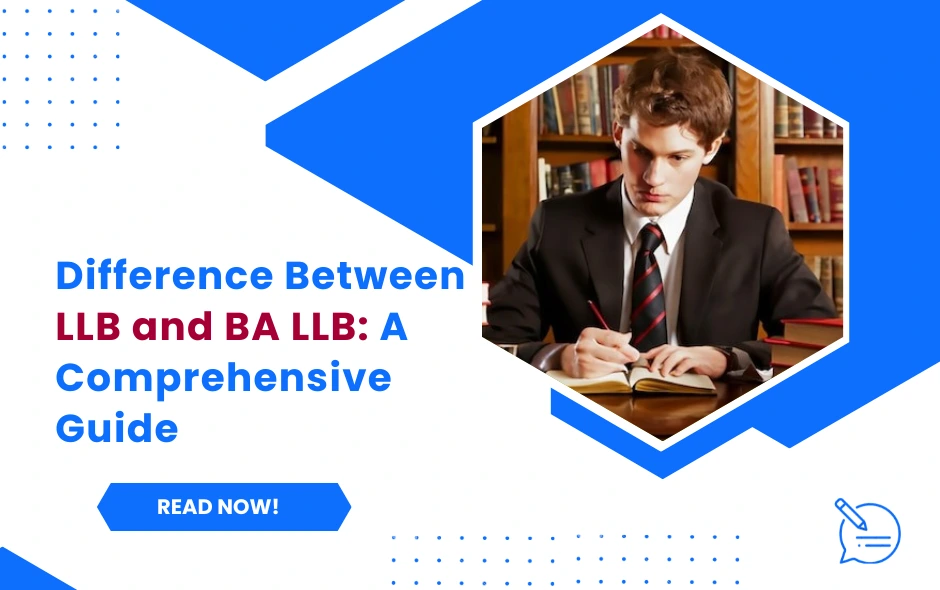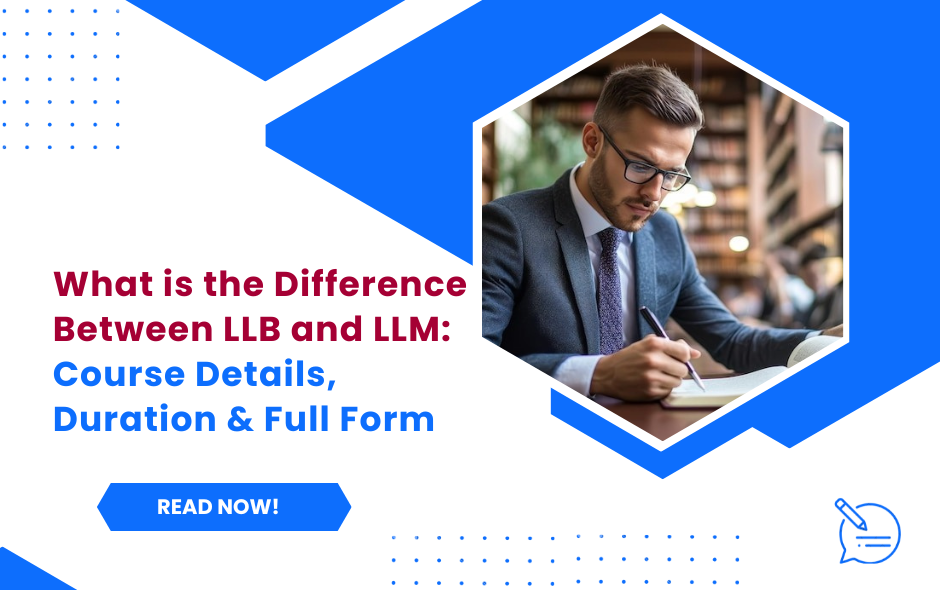BBA LLB after 12th: Everything You Need to Know
Confused about what to pursue after Class 12? Craving a career that blends business acumen with legal expertise? Then, a BBA LLB program might be the perfect fit for you! This integrated course offers a unique opportunity to delve into both the exciting world of business administration and the intricacies of the legal system, all within a five-year timeframe.
This comprehensive guide will explore everything you need about BBA LLB after 12th. We'll cover eligibility criteria, typical entrance exams, course structure, career prospects, and more. So, buckle up and get ready to unlock the exciting potential of a BBA LLB degree!
What is BBA LLB?
A BBA LLB, also known as an Integrated BBA LLB After 12th program, is a five-year undergraduate course that combines the in-depth study of business administration with a thorough grounding in law. This unique combination equips graduates with a comprehensive understanding of commercial principles and the legal frameworks governing them.
Essentially, a BBA LLB After 12th program allows you to:
- Gain a strong accounting, marketing, finance, and human resource management foundation.
- Develop critical legal skills such as analytical thinking, research, communication, and problem-solving.
- Understand the intricate relationship between business operations and the legal landscape.
This integrated approach opens doors to diverse career opportunities, making it a popular choice for students seeking a well-rounded education that prepares them for success in the dynamic world of business and law.
BBA LLB After 12th: Eligibility Criteria
Cracking the code to get into a coveted BBA LLB After 12th program requires fulfilling specific eligibility criteria set by the universities or institutes offering the course. Here's a breakdown of the typical requirements:
Academic Qualification:
- You must have passed Class 12 from a recognised board.
- Minimum marks requirement varies across institutions, but generally falls between 45% and 55% aggregate marks (with relaxation for SC/ST candidates). Some universities might specify subjects like Mathematics, Commerce, or Economics, while others might accept students with broader backgrounds.
BBA LLB After 12th Entrance Exams: Conquering the Gateway
While the specific eligibility criteria might vary slightly between institutions, cracking the entrance exam is crucial for securing your seat in a coveted BBA LLB After 12th program. Here's a breakdown of some of the most common entrance exams you'll encounter:
- CLAT (Common Law Admission Test): This national-level exam is a high-stakes test for aspiring law students. It assesses your legal reasoning, analytical thinking, logical reasoning, comprehension, and general knowledge. Scoring well on CLAT opens doors to many prestigious universities offering BBA LLB After 12th programs.
- LSAT-India (Law School Admission Test - India): Another prominent national-level exam, LSAT-India, focuses on your analytical reasoning, logical reasoning, and reading comprehension skills. Scoring well on the LSAT can grant admission to top law schools with BBA LLB After 12th programs.
- University-specific entrance exams: Many universities conduct exams for their BBA LLB After 12th programs. These exams might follow a similar format to national-level tests but may also include sections specific to the university's curriculum or focus areas.
Preparing for the BBA LLB After 12th Entrance Exams:
Acing these exams requires strategic preparation. Here are some tips to get you started:
- Start early: Don't wait until the last minute to begin studying. Dedicate ample time to thoroughly understand the exam format, content areas, and weightage of different sections.
- Focus on core skills: Sharpen your analytical reasoning, logical reasoning, reading comprehension, and legal aptitude skills through practice tests and targeted study materials.
- Build a strong vocabulary: A strong vocabulary is critical to comprehending legal jargon and complex passages encountered in the exam.
- Practice mock tests: Take regular tests to simulate the exam environment, identify your strengths and weaknesses, and develop time management strategies.
- Seek guidance: Consider enrolling in coaching classes or seeking advice from experienced mentors or educators to understand the exam better and refine your preparation approach.
By strategically preparing for these entrance exams, you'll significantly increase your chances of securing admission to a top-notch BBA LLB After 12th program. In the next section, we'll explore the typical course structure of this integrated degree.
BBA LLB Eligibility Criteria
Completion of 10+2: Candidates must have passed their 12th standard or equivalent examination from a recognized board. Minimum Percentage: Most institutions require a minimum aggregate percentage of 45-50% in the 12th standard. This may vary for different categories (General, SC/ST, OBC)
BBA LLB After 12th: Subjects and Syllabus Demystified
The BBA LLB After 12th program offers a unique blend of business and legal studies, reflected in its comprehensive syllabus. Here's a breakdown of the typical subjects you can expect to encounter across various universities:
Business Management Subjects:
- Financial Accounting: Understanding financial statements, accounting principles, and financial analysis.
- Marketing Management: Exploring marketing strategies, consumer behaviour, and market research.
- Human Resource Management: Learning about recruitment, training, performance management, and employee relations.
- Principles of Management: Grasping management theories, leadership styles, and organisational behaviour.
- Business Communication: Developing practical communication skills for business scenarios.
- Business Law: Understanding the legal framework governing business operations.
- Business Statistics: Applying statistical methods to analyse business data.
- Entrepreneurship: Exploring the fundamentals of starting and managing a business.
Law Subjects:
- Legal Method and Research: Learning legal research methodologies, case analysis, and legal writing.
- Constitutional Law: Understanding the Indian Constitution, its principles, and its application.
- Contract Law: Studying the formation, enforcement, and termination of contracts.
- Criminal Law: Exploring the principles of criminal justice, offences, and punishments.
- Law of Torts: Understanding civil wrongs and remedies available to victims.
- Civil Procedure & Criminal Procedure Code: Learning the procedural aspects of civil and criminal litigation.
- Jurisprudence: Examining the philosophy of law and legal theories.
- Taxation Law: Understanding various tax laws and their implications for businesses and individuals.
- Company Law: Studying the legal framework governing companies and corporate governance.
Additional Components:
- Moot Court Sessions: Participating in simulated court proceedings to develop legal reasoning and advocacy skills.
- Dissertation: Conducting independent research and writing a thesis on a chosen legal or business topic.
- Specialised Electives: Depending on the university, you might have the option to choose electives in specific areas of law, such as Intellectual Property Law, Cyber Law, or Banking Law.
BBA LLB After 12th: Career, Scope, and Job Profiles
The unique combination of business acumen and legal expertise cultivated through a BBA LLB After 12th program opens doors to diverse and promising career opportunities. Here's a glimpse into the exciting scope and potential job profiles for BBA LLB graduates:
Corporate Sector:
- Corporate Lawyer: Advise companies on legal matters related to contracts, mergers and acquisitions, intellectual property, and regulatory compliance.
- Legal Counsel: Work within a company's in-house legal department, guiding day-to-day operations and strategic decisions.
- Compliance Officer: Ensure the company adheres to all legal regulations and ethical standards.
- Merger and Acquisition Manager: Manage the legal aspects of mergers, acquisitions, and divestitures.
Legal Practice:
- Litigator: Represent clients in court proceedings, handling civil or criminal cases.
- Judge: Pursue a career in the judiciary, presiding over cases and delivering judgments.
- Legal Consultant: Offer legal advice and services to individuals and businesses on a contractual basis.
Other Lucrative Avenues:
- Business Consultant: Leverage your understanding of business and law to advise companies on legal and strategic matters related to their operations.
- Company Secretary: Ensure a company's compliance with corporate governance regulations and filing requirements.
- Human Resource Manager: Manage employee relations, ensuring compliance with labour laws and regulations.
- Banking & Insurance Sector: Specialize in banking or insurance law, working for financial institutions or legal firms dealing with these sectors.
- Intellectual Property Law: Protect and enforce intellectual property rights like trademarks, copyrights, and patents.
Conclusion:
A BBA LLB program after 12th equips you with the knowledge and skills to navigate the complexities of the business and legal world. CGC Jhanjeri's BBA LLB program prepares you for a dynamic career path by combining business principles like accounting and marketing with legal subjects like constitutional law. From corporate law to consultancy services, this integrated degree opens doors to opportunities with strong salary prospects.
Frequently Asked Questions: BBA LLB After 12th
1. What is BBA LLB?
Ans: BBA LLB is a five-year integrated undergraduate program combining business administration (BBA) and law (LLB) education.
2. Who should pursue BBA LLB after 12th?
Ans: Students who are interested in both business management and law and want to pursue a career in corporate law, management, or legal services.
3. What is the eligibility for BBA LLB after 12th?
Ans: Generally, students need to have passed their 12th standard (with a minimum percentage, usually 45-50%) in any stream (arts, science, commerce).
4. What are the career prospects after BBA LLB?
Ans: Graduates can pursue careers as corporate lawyers, legal advisors, law firm associates, or work in multinational corporations, government agencies, and NGOs.
5. What is the admission process for BBA LLB?
Ans: Admissions are typically based on entrance exams, merit, or both. Popular exams include CLAT, LSAT, or university-specific exams.




















